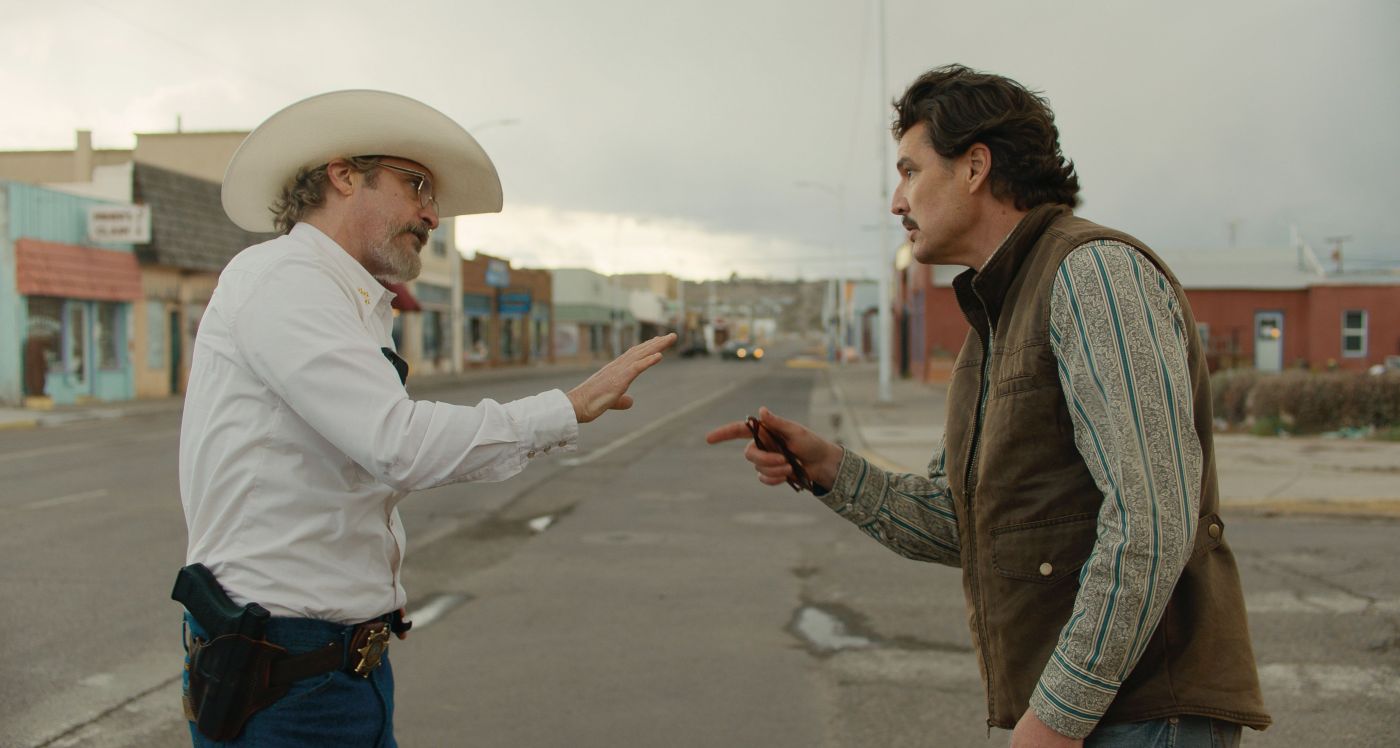
The COVID-19 pandemic and shutdown turned many Americans into social media gunslingers, tell-all posters and disruptors who shot from the online hip and rode roughshod over reason and facts. They favored conspiracies and adhered to their own belief systems and individual freedoms, damn the consequences.
“Eddington,” Ari Aster’s “High Noon-ish” ticking time-bomb of a film set in a dusty New Mexico cowpoke town taps the collective insanity that resulted from the 2020 lockdown where few of us saw straight and viewed the act of donning of a mask either as virtuous or foolish. (It lands in theaters July 18, here’s what to watch until then.)
Aster’s fourth and most ambitious feature satirically and boldly looks at the Great Divide that nudged America into becoming a hair-trigger nation, as the pandemic moved nascent fears and resentments off the back-burners of our psyches and onto the sizzling grill ready to charbroil our indivisible nation to a crisp.
“Eddington” is an intricately plotted escalation into the absurd — a common theme in Aster’s works — “Hereditary,” “Midsommar” (still his finest hour) and “Beau Is Afraid.” It’s not perfect by any means, but does it ever have a mind of its own and a sense of sublime craftsmanship. It’s seamlessly edited by Lucian Johnston — a key figure on any Aster feature — offers an uncanny soundtrack from Daniel Pemberton and boasts some of the best cinematography of the year from Darius Khondji.
True to form, Aster doesn’t quite know when to stop and stuffs in too much, but the violent absurdity he doles out here is in lock-step with the anything-goes craziness that now transpires in our world on a daily basis.
Everything and everybody does come undone in Eddington, a coveted, out-of-the-way New Mexico town where the main restaurant serves both Mexican and Greek cuisine and a big solar energy project is proving it could be a wedge issue with some — just like everything else is. That massive solar biz plays in the background throughout and winds up a sneaky symbol, but it is the dust-up between Sheriff Joe Cross (Joaquin Phoenix) and charismatic mayor Ted Garcia (Pedro Pascal) where Aster centers his buckshot and addresses a clamor of hot-button issues, including the Black Lives Matter movement, Indigenous land rights, fake media gurus (portrayed with such faux sincerity and spiritual enlightenment by an under-utilized Austin Butler) and so on.
All of these factor in the personal tumult inside the main characters, but it’s a decades-stewing resentment that’s been needling Joe, specifically a questionable relationship between his depressed wife Louise (Emma Stone) and Ted. He funnels his rage by becoming more strident over not wearing a mask, so much so that he decides on the spur of a social media moment to oppose Ted in a reelection bid where he spouts off false statements. Ted, though, is a formidable foe, a single dad and smooth operator who thinks he’s above the mandates that he mandates, including convening a council meeting at the bar he owns in town where an unhoused new stranger gets into a tussle with Joe. Stay tuned, like everything else, it figures in later.
Sheriff Joe Cross (who does have a Messiah complex; after all those J.C. initials aren’t there for nothing in an Aster movie) transforms his itty-bitty sheriff’s office with one Black cop (Micheal Ward) and one White one (Luke Grimes) into his campaign headquarters.
What ultimately unmoors Joe is the arrival of Vernon Jefferson Peak (Butler) that who stomps on his manhood by entrancing his doll-making-obsessed wife Louise and, for a brief stint, Louise’s shrewd calculating mom (played well by Deirdre O’Connell), who’s in lockdown mode with them. False social media prophets are effectively positioned in Aster’s crosshairs, but how he places them and moves them on his narrative chessboard is certain to surprise and inspire debate.
Other Aster choices destined to divide offend include how he satirizes what took place after the death of George Floyd and how he portrays youthful viral dissenters as being sanctimonious, shrill and selfish.
Everyone watching will, at one time or another, get their cultural and political feathers ruffled, and some of the disdain directed at Aster might well be deserved – in particular the film’s ridiculously violent final act that needed a bit more finessing to give it the punch Aster was aiming for.
The carnage leads to a sigh of an epilogue that seems, without giving anything away, like a curious letdown, a cruel little snicker from Aster that doesn’t entirely satisfy. But like the enormity of the rest of this bold and destined-to-be-a-classic neo-Western, the intent is to polarize an audience and nudge viewers into looking at their part in the polarization.
Regardless of how you ultimately stand on “Eddington,” what is undeniable is that it will stay lodged in our collective craws for a long time, as we continue to watch how the themes it incorporates escalate to absurd levels on a daily basis. The fact that it holds a mirror to all the craziness and offers no solutions, could be what we don’t want to see but perhaps probably should.
Contact Randy Myers at [email protected].
‘EDDINGTON’
3½ stars out of 4
Rating: R (strong violence, grisly images, language and graphic nudity)
Starring: Joaquin Phoenix, Pedro Pascal, Emma Stone, Luke Grimes, Deirdre O’Connell, Micheal Ward
Director/screenwriter: Ari Aster
Running time: 2 hours, 25 minutes
When & where: Opens July 18 in theaters with screenings late afternoon to evening screenings July 17.